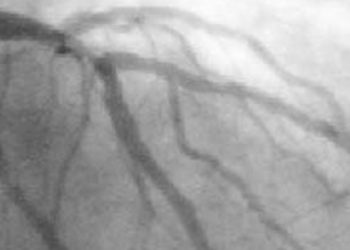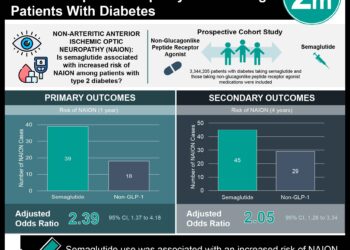GLP-1 receptor agonists lower adverse cardiac event risk in veterans with type 2 diabetes
1. In this retrospective cohort study, glucagon-like peptide-1 receptor agonists (GLP1RA) were associated with a lower risk of major adverse cardiac events (MACE) in veterans with type 2 diabetes compared to dipeptidyl peptidase-4 inhibitors (DPP4i).
2. The addition of a sodium-glucose cotransporter-2 inhibitor (SGLT2i) was not associated with a primary reduction in major adverse cardiac events as compared with DPP4i use.
Evidence Rating Level: 1 (Excellent)
Study Rundown: Type 2 diabetes has been shown to confer a high risk for cardiovascular disease. Though, it is less clear whether onset of cardiovascular disease can be prevented by newer anti-diabetic non-insulin medications. Prior studies have shown that GLP1RA or SGLT2i versus placebo have benefit in preventing MACE among those with type 2 diabetes and preexisting cardiovascular disease (CVD). However, there is still a gap in knowledge as to understanding whether patients with diabetes received benefit from adding either GLP1RA or SGLT2i compared with DPP4i for primary prevention of MACE. Overall, this study found that among a national cohort of veterans patients, adding GLP1RA was associated with primary prevention for MACE and heart failure versus DPP4i. Notably, SGLT2i use was not associated with primary prevention for MACE and heart failure. This study was limited by patients being excluded if their initial diabetes therapy did not include metformin, sulfonylurea, or insulin. Nevertheless, these study’s findings are significant, as they demonstrate that GLP1RA was associated with primary prevention for MACE and heart failure versus DPP4i in this cohort of veteran patients with type 2 diabetes.
Click to read the study in AIM
Relevant Reading: Comparative Effectiveness of Diabetes Drugs: The Use and Misuse of Observational Research
In-Depth [retrospective cohort study]: This retrospective cohort study recruited exclusively veterans from the Veterans Health Administration cohort. Patients who were aged 18 years or older, regular Veterans Health Administration users, and had a newly filled their first anti-diabetic medication prescription (metformin, insulin, or sulfonylurea) without any antidiabetic fill in the 180 days prior were eligible for the study. Patients who did not receive any of these medications, who used all three medications (metformin plus sulfonylurea plus insulin), or who used another drug class for diabetic control were excluded. Patients receiving dialysis, organ transplant, or hospice care were also excluded. The primary outcome measured was time to MACE or heart failure hospitalization. The outcome date was hospital admission date for acute myocardial infarction, ischemic or hemorrhagic stroke, acute heart failure, or cardiovascular death date. Outcomes in the primary analysis were assessed via Cox proportional hazards models with pairwise comparisons. Based on the primary analysis, GLP1RA use was associated with lower MACE and heart faulre versus DPP4i (adjusted Hazard Ratio [aHR], 0.82; 95% Confidence Interval [CI], 0.72 to 0.94), yielding an adjusted Risk Difference (aRD) of 3.2 events per 1000 person-years (95% CI, 1.1 to 5.0). Conversely, SGLT2i use was not associated with MACE and heart failure compared with DPP4i use (aHR, 0.91 [95% CI, 0.78 to 1.08]; aRD, 1.28 [95% CI, -1.12 to 3.32]). In summary, this study demonstrates that adding GLP1RA is associated with reductions in MACE and heart failure hospitalization in veterans with type 2 diabetes.
Image: PD
©2023 2 Minute Medicine, Inc. All rights reserved. No works may be reproduced without expressed written consent from 2 Minute Medicine, Inc. Inquire about licensing here. No article should be construed as medical advice and is not intended as such by the authors or by 2 Minute Medicine, Inc.







